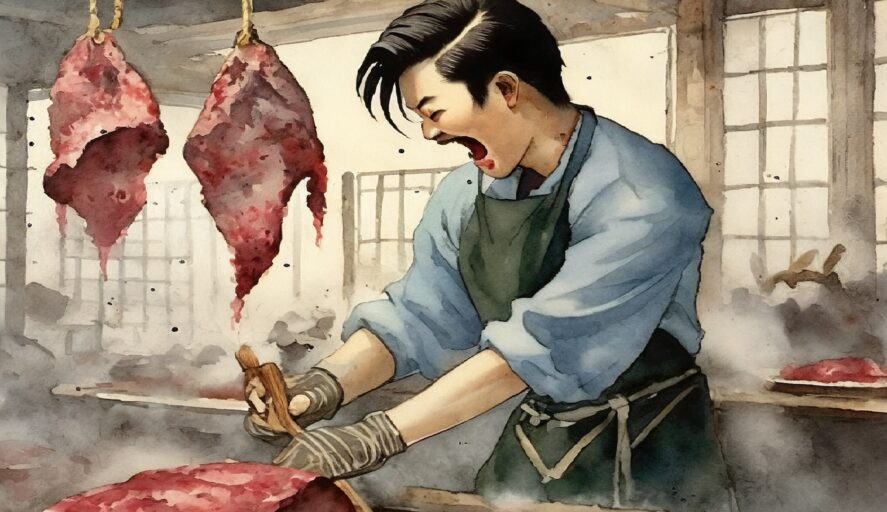LAST WEEK: Missionaries come to China, bringing with them werewolf DNA. Wang Lijun is born a werewolf and kills his little brother, Bao.
Read last week’s installment here. See all installments here. Read the next installment here.

Chapter 56
Jim
Raybrook — 1984
Rainbow Crow
Most folks think crows are just a black noisy nuisance, but I’ve always liked ‘em. Maybe it’s because folks thought I was a pest, too, or maybe because crows fly. They wouldn’t end up behind bars… at least not usually. They’re street smart. They’re survivors. Most native tribes respected crows. They thought just seeing a crow was lucky…. Though I wouldn’t say native cultures are famous for their luck… Maybe that’s another reason I like crows. I could use some luck.
Wolves are the same. Wild. Free. The book of Totems said that when the time came to create the earth, a great council was held. All the animals were invited except Wolf Star. He resented this treatment and looked for ways to express his anger.
He began to watch the Storm That Comes Out of the West, who was responsible for traveling the world and seeing that all was well. In his travels, the Storm That Comes Out of the West carried a whirlwind bag in which he kept the first people. Every evening, he would stop and release people and they would camp and hunt.
Seeing an opportunity, Wolf Star sent a gray wolf from the sky to steal the whirlwind bag. While Storm was asleep, the wolf took the bag and ran away. He finally opened it, thinking he might find something to eat, and the first people came out and set up camp.
Well wouldn’t ya know it, his luck was just as bad as mine, because when the first people realized there were no buffalo to hunt, they became angry and killed the wolf.
When the Storm that Comes Out of the West came upon the first people and the wolf they had killed, he told them to skin the wolf and make a sacred bundle with it, wrapping it in everything that would bring back the memory of what they had done. By killing the wolf, they had brought death into the world. That had not been the plan, but now that was the way it would be.
Thereafter, he told them, they would be known as the wolf people, the Skidi Pawnee.
And from that day to this, Wolf Star continues to rise just before dawn, reminding the people that it was they who had brought death to the world.
Figures. People don’t like what’s wild and free.
These tales captured me. They seemed more honest than history. Reality can just be a skin, a casing. God knows you can’t believe what you see. Acid showed me that. These stories felt like the soul inside the skin.
At home each night, I read about totems, wolves, crows, and coyotes. In the garage each day, I’d create them; though to be honest, it seemed more like they were creating themselves.
One day, I went to work and there was nothing there. The whole shop and sisters three had vanished. There was just an empty field where they had been.
I hid in my room for about four days, just freaking out. I didn’t feel crazy, just scared. Shock is like grief; you nurse yourself for a while and then you go on.
When I finally climbed out from under the covers, I bought a rusty blue Ford pick-up, packed up my few clothes, the book of Totems, and started driving.
Driving toward the mountains, the sunlight hit my windshield. There on the glass, drawn in ghostly outline, were the silhouettes of roses and birds flying skyward.
Chapter 57
Wang Lijun
China — 1966
Lonely Journeys
When the second full moon rises, bringing transformation and hunger, Lijun understands. He is cursed, damned to be forever alone and apart.
Every month, just before the moon climbs full and round into the night sky, Lijun leaves home and hides in the fields. He strips, secreting a few rags and his clothes in a ditch. At first light, he runs crouching and naked to the pond. Submerging his body in the shallow, murky water, he washes the blood from his face and scrapes tissue from beneath his fingernails. Emerging muddy but cleansed, he towels the dirt away and dresses, hiding the rags near the house. Late on some half-moon night when Fan and Jun Mei are asleep, he will wash the rags, saving them for his next metamorphosis.
He tells his father he is staying at the house of a teacher. He is learning to do figures. It will make him more helpful on the farm. His father grumbles but gives him permission. Since Bao’s death, his father has ceased to care. Jun Mei too, is indifferent. Lijun is free of obligation, expectation, and hope.
The surrounding farms begin suffering from odd attacks. Livestock and children disappear. No one feels safe. Jun Mei tries to keep Lijun home. She feels no love, but she doesn’t want to be viewed as careless.
At eighteen, Lijun leaves. He walks for a week to reach the harbor town of Dalian. It is a hot and dusty way. Travelers are rare. The few there are will not stop for the dirty, hairy boy with a single brow. Kind men, who dote on children and are gentle with animals, beat their oxen till their sides run with blood in their haste to be away from the strange boy. Migrating birds change their routes so as not to fly over him. Even the soft rains that usually feed the land cease to fall.
Wang Lijun is starving when he reaches Dalian. With a few stolen yen, he books passage on a ship bound for America. It’s a fifteen-day voyage, but rough winds cause a delay. When still at sea, the full moon rises, brilliant and deadly. Wang Lijun locks himself in a cabin, stuffing a towel in his mouth to smother the uncontrollable urge to howl.
Wang Lijun arrives in San Francisco and finds his way to Chinatown along with many other Asian immigrants, unnoticed and almost starved. He takes a job at a butcher shop. At night, he hides in the meat locker gorging himself on the bloody carcasses of cattle. He leaves at dawn, red with gore.
He sleeps under bridges and in alleyways near the bay. The neighborhood is emptied of abandoned cats and stray dogs. Vermin vanish. Homeless men and women disappear. The mayor is commended. The city council applauds. Everyone wins reelection. Wang Lijun is full.
Chapter 58
Jim
The Catskills — 1984
Mountains of the Sky
I drove that ancient pick-up all the way out into the Catskill Mountains. Even after that trek, that good old Ford was running strong. Still is.
I rented a place out in the woods about ten miles from Greene Village, New York. It was tiny; just bed, bath, and stove, but I didn’t need more.
There was a big old barn on the property I set up shop in. The wood was gray from weather and holey from bugs, but it was fine. The ceiling was high, and light filtered in, making loose cobwebs shimmer like strands of rainbow. Funny, I never thought I’d want to go back to the country again. But here I am, enjoying the peace and solitude. Some nights, I hear howling, probably just coyotes, but I like to pretend it’s wolves. Not that I don’t like coyotes. They’re amazing critters, survivors, the only large predator that prospers when we try to annihilate it.
I’m more like a wolf, unable to adapt, easily exterminated. Coyotes are the crows of the canine world: able to thrive anywhere, clever, cagey, and not very popular. At least I have that in common with them.
I’ve established a routine here. Each morning, I go to the barn and weld. Crows, coyotes, and wolves spring flying and running out of my fingers like breath. ‘Round noon, I take a walk. Once or twice a week, I ride out to Greene and sell some pieces. Tourists love ‘em.
The mountains here are beautiful, green as the name of the village in summer, orange and red as the sunset in the fall. They are sliced by fissures, over a thousand feet deep and high. Swirling brooks tumble down the rocky steps. The locals call these clefts the “cloves.” The “cloves” were used as roads across these mountains, first by the natives, then by the Dutch and English.
The native name for these mountains is the Onteoras, Mountains of the Sky. It’s how I like to think of ‘em.
Chapter 59
Gabriel
San Francisco — 1984
Flawless Affection
It’s unbelievable. Gabriel is making a living selling his jewelry at a single store. It’s lucky for him that the Bay Area is so populated with vampires, or he would not be able to come close to keeping up with the demand. As quickly as he delivers necklaces, they sell.
When Gabriel is not present, not associated with the pieces, they retain their magic and lose their menace. Since The Mystic Eye is in The Castro, its customers are usually men, usually gay. The fruits of Gabriel’s hands are irresistible to those desirous of a perfect, unobtainable beauty, a flawless affection, permanent and unchanging as stone.
Gabriel never sees anyone in the shop when he makes his deliveries. Still, the sisters have told him to come by at 10:30 pm, a time when most aren’t shopping.
When he’s welding, he feels something akin to peace, linking gems to metal like proteins, like creation. The sisters, though, make him feel unsteady, as if he might not be in complete control of his fate. It’s odd and disconcerting, yet he feels drawn to them in spite of, perhaps even because of, this.
And after each meeting, Gabriel dreams, each time a little longer. Each dream adds a stroke of color to his pallet—a dab of violet, a touch of cherry, a smattering of ginger, rushing in like a river to fill the empty places in his soul. Each dream ends in a sky of ash and voices crying in the night. Slowly, one by one, reds, purples, and burgundies dot his monochromatic existence.
Watch the author read this week’s installment in the video below:

NEXT WEEK: What is the difference between a ghost, a dream, and a memory? Where is the divide between belief and hope? There is a reason spirits wander. As long as you are a nightmare in the dark, as long as someone knows your name, you are not gone.
Edited by Mitchelle Lumumba and Sophie Gorjance.
E.E. King is cohost of the MetaStellar YouTube channel's Long Lost Friends segment. She is also a painter, performer, writer, and naturalist. She’ll do anything that won’t pay the bills, especially if it involves animals. Ray Bradbury called her stories “marvelously inventive, wildly funny and deeply thought-provoking. I cannot recommend them highly enough.” She’s been published widely, including Clarkesworld and Flametree. She also co-hosts The Long Lost Friends Show on MetaStellar's YouTube channel. Check out paintings, writing, musings, and books at ElizabethEveKing.com and visit her author page on Amazon.

